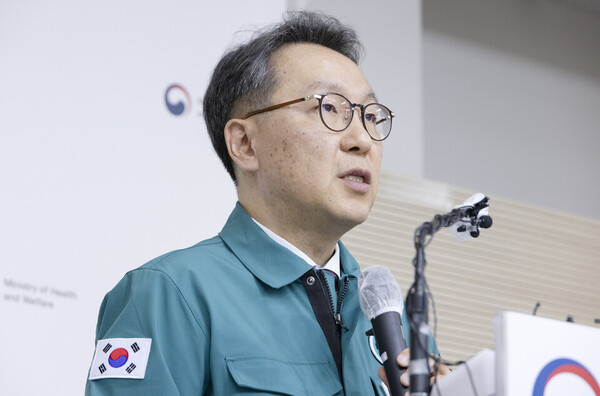The Korean government has made a formal proposal to the nation's medical community, urging them to appoint representative members to engage in discussions on critical issues such as the expansion of medical school quotas and the cessation of ongoing collective actions, including strikes and mass resignations from resident doctors and medical school students that have significantly impacted the healthcare system.

During a press briefing by the Central Disaster and Safety Countermeasures Headquarters, the authorities expressed their willingness to negotiate on all matters, including the contentious increase of medical school admissions by 2,000, conditional upon the termination of what they describe as illegal collective actions.
"Every agenda, including the quota, is open for discussion. However, the government has repeatedly explained the necessity of the proposed increase to 2,000 students, and our position remains unchanged at this moment," Vice Minister of Health and Welfare Park Min-soo said. "We are open to discussing the scope of the increase. However, we cannot accept negotiations under the threat to public health posed by illegal strikes."
Addressing the dire situation further, the government assured resident doctors involved in collective actions that they would not be held accountable if they returned to their duties by Thursday.
This statement was made amid growing concerns about the strike's impact on patient care and the overall operation of hospitals.
"Starting March, legal and principle-based actions, including a minimum three-month suspension of medical licenses and subsequent investigations and prosecutions, will be inevitable for non-returnees," Park said.
He emphasized the long-term consequences of such penalties, including potential impacts on future employment prospects abroad, urging the doctors to reconsider their stance.
Medical community experts stressed that the deadline appears to be strategically aligned with the end-of-month contract renewals of the youngest fellow doctors in hospitals, who are critical to filling the gaps left by the striking residents.
Having completed their residency and earned specialist qualifications, these fellows play a pivotal role in maintaining hospital operations, including outpatient care, surgeries, and inpatient management.
With some fellows expressing reluctance to extend their contracts amidst the turmoil, there is a looming threat of a real healthcare crisis if they, too, decide to leave the medical field. This concern is exacerbated by the government's observation that the number of striking residents has not significantly decreased despite repeated warnings and the emphasis on a strict response.
As of last Friday, approximately 80.5 percent of resident doctors at major training hospitals, amounting to 10,034 individuals, had submitted their resignations, according to the government. This alarming figure underscores the depth of the crisis and the urgency for a resolution.
Medical school teachers offer new resolution
In an attempt to find common ground, academic figures from the medical field have put forward a compromise suggesting an increase in medical school seats by 350 to 500.
This proposal follows a survey conducted among 201 professors at Sungkyunkwan University's School of Medicine, marking the first time such a consensus has been sought among Korea's medical educators.
According to the survey, while 25 percent opposed any increase, a majority supported a moderate increase, with 45.8 percent favoring an increment between 350 to 500 seats.
"This is the first survey of its kind in Korea, and we believe it will play a significant role in narrowing the gap between the government and the medical community," Professor Hong Seung-bong, Chairperson of the Sungkyunkwan University Medical School Faculty Association, said.
He emphasized the urgent need for a resolution, stating, "The government and the Korean Medical Association should start negotiations based on the results of this survey, and resident doctors should return to the hospitals to protect patients' lives."
The committee warned that the current medical crisis could escalate into a disaster by March, citing the indispensable role of residents and interns in the university hospital system.
"The situation in university hospitals in 2024 is much more sophisticated and specialized than during the 2000 medical division reform," the association said. "Without the system of professors, attending doctors, residents, and interns, procedures like organ transplants and cancer treatments become impossible."
The committee criticized both the government for its abrupt announcement to increase medical school quotas by 2,000 and the medical community for its persistent opposition to quota increases over the last 20 years as contributing factors to the crisis.
They suggested that the government's prediction of a future doctor shortage and the resultant hasty quota increase announcement, leading to mass resignations and student leaves of absence, were unprecedented globally.
The association concluded with a call for compromise, emphasizing that the side that concedes more will ultimately win in the conflict between the government and doctors.
Related articles
- Expert proposes cutting annual med student quota increase to 1,000, instead of 2,000
- Government rules out using oriental medicine practitioners to replace striking physicians
- Seoul moves to fill junior doctors’ void with PA nurses, but hospitals say ‘No.’
- Potential exodus of Korean doctors as they pursue opportunities abroad amid dispute over medical school quotas
- Korean MZ doctors mock health official's slip of the tongue with AI-generated bird images
- Government, doctors regret misreports on octogenerian’s death in ambulance
- Seoul moves to ease penalty on medical malpractice to placate physicians
- 'Junior doctors defying Seoul's return-to-work order could face legal liability for medical error'
- University leaders, medical professors clash over med school enrollment quotas
- Korean medical crisis escalates as government starts suspending striking doctors' licenses

